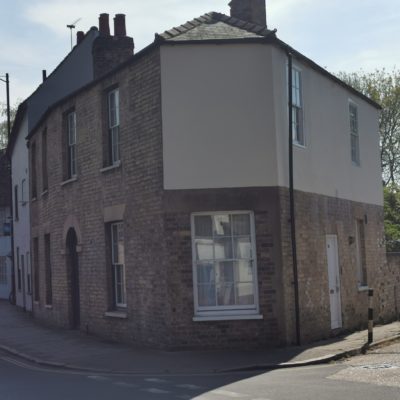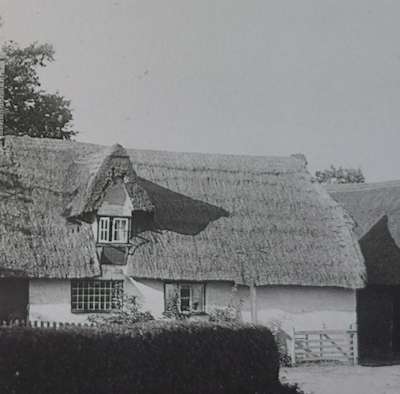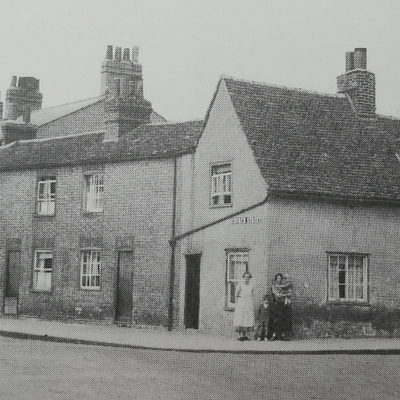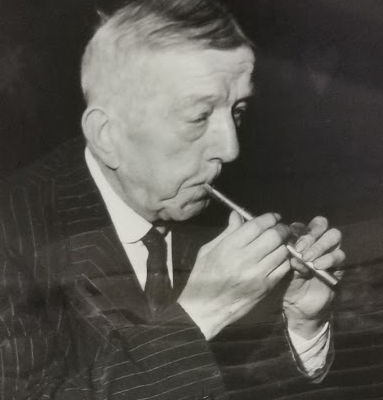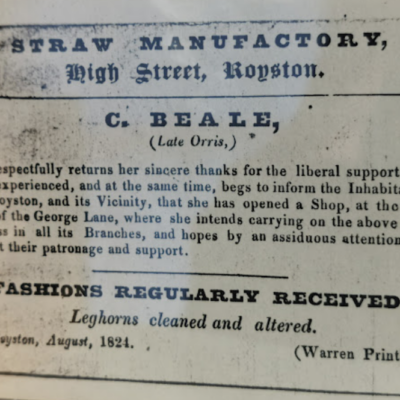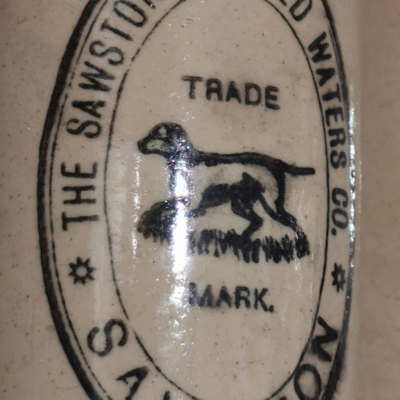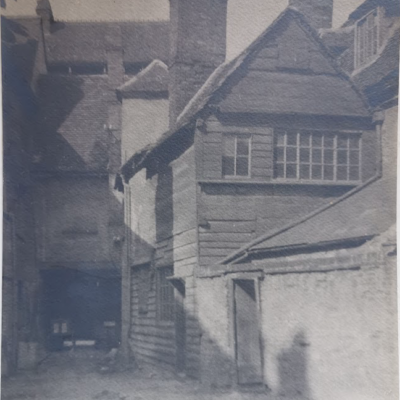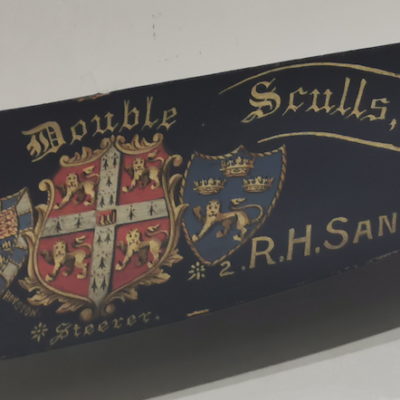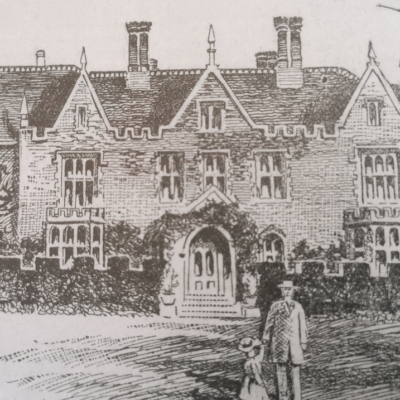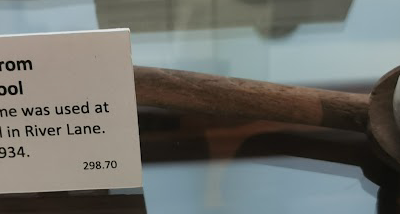Search by topic
- archaeology
- architecture
- bricklayer
- Building of Local Interest
- carpenter
- church
- crime
- dressmaker
- fire
- general labourer
- Great Eastern Railway
- listed building
- medieval
- oral history
- Public House
- Rattee & Kett
- Roman
- scholar
- school
- Then and Now
- tudor
- women
- work
- world war one
- world war two
Search by text
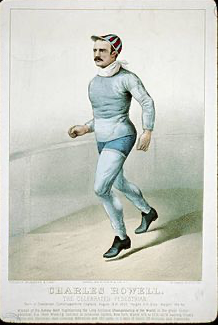 Charles Rowell, 1879
Charles Rowell, 187920a (21) (14) (16) Portugal Place, Maypole / Paul Pry
History of the Maypole
1839-42 Paul Pry listed
1843-51 not listed
1851 new licence granted to Gayler for Paul Pry
1851 Charles Bull, beer retailer (Gardner’s)
1852-56 Maypole listed
Ann Rogers was previously married to Charles Bull the previous tenant in 1851. He died in 1860 and she remarried Harry/Henry Rogers in 1860.
1861 (16)
Henry Rogers, publican, 41
Ann Rogers, 45
Alfred Bull, son in law, boot claxer, 41, b Scotland
Edward Bull, son in law, cooks apprentice, 45, b Huntingdon
Walter Bull, son in law, tailors apprentice, 15, b Cambridge
Emma Bull, daughter in law, 13, b Cambridge
Sarah A Bull, daughter in law, 11, b Cambridge
Catherine Bull, daughter in law, 9, b Cambridge
Clara Bull, daughter in la, 1, b Cambridge
David Jones, boarder, tailor, 29, b Salop
William Harmes, boarder, tailor, 27, b Kent
1869 Mrs Ann Rogers (Post Office Directory)
1871 (14)
Ann Rogers, inn keeper, widow, 55, b St Neots
Kate Bull, daughter, schoolmistress, 19, b Cambridge
Clara Bull, daughter, 17, b Cambridge
Robert D Allen, lodger, stonemason, 30
James Tyte, lodger, cabman, 26
1879 Mrs Ann Rogers (Kellys)
”””””’
1881 (14)
Ann Rogers, innkeeper, widow, 65, b St.Neots
1883 Mrs Ann Rogers (Kellys)
1888 Mrs Ann Rogers (Kellys)
1891 Maypole
1892 Mrs Ann Rogers (Kellys)
1896 Wm Edmunds Wing (Kellys)
1897- 1903
Charles Rowell (world famous pedestrian) became licensee. He had been living at 19 Milton Road, and before that had been based at the Bleeding Heart in Chesterton.
1901 Public House The May Pole
Charles Rowell, 48, publican, b Chesterton
Henrietta, 40, b Cambridge
Annie Porter, 34, visitor, b Cambridge
Maude, visitor, 7, b Chesterton
Charles Rowell was considered one of the greatest long distance runners of his age. He had started working in Foster’s Boatyard but became an international celebrity. He died in 1909.
1902
29.12.1902: (Cambridge Daily News) Charles Rowell arrested and charged with embezzling money from the Maypole Self Help Club.
CHARLES ROWELL ARRESTED. Charles Rowell, licensed victualler, of Cambridge, a one time famous athlete, brought up the Cambridge Borough Police Court this (Monday) morning on a charge of embezzling—being one of or more beneficial owners—the sum of £38 6s 7d. the money of James Ferguson and others, members of the Maypole Self Help Club, on December 19th, 1902. The magistrates on the Bench were: Mr C. J. Clay (in the chair), Messrs J. Burford and G. Smith. The case excited great public interest, and a large number of the general public were in court. Mr E. Vinter, who appeared for the prosecution, outlined the ease. The prisoner, he said, held, formerly held, the licence of the Maypole public house, Portugal place. On January 9th, 1900 after he took the Maypole, the Maypole Self-Help Club was formed. It was governed by a chairman and two stewards, elected annually, and by a secretary and treasurer, also elected annually. Prisoner was elected treasurer of the club. The members paid a weekly subscription of 6d, and the objects of the club, he understood, were to provide sick benefit for members who were ill, and then at the end of each year the money in hand was equally divided between the members so that nothing was carried forward from one year to another. The committee met each week. The secretary and treasurer were always present, and the subscriptions wore paid by the members at those meetings. The secretary and treasurer sat at a table. The secretary had a book which he called the contribution ledger, containing the names of all the members of the club. He also had a book in which he entered the total amount of subscriptions which were paid by the whole of members each week. As a member paid his money the secretary made an entry in the ledger opposite the name of the member, and then entered it on a card which each member brought with him. That card was handed back the member. At the end of the evening the total amount of receipts was entered in the secretary’s receipt book, and the money was handed to the treasurer, who initialled the book and took the money.
The Chairman: Is he supposed to bank the money?
Mr Vinter: He is supposed to keep the money, because there are sick payments which have to made at once. Therefore, he keeps the money. Proceeding, Mr Vinter said that every quarter the books wore audited, but he understood the money was not produced.
The Clerk (Mr Bonnett): Under those circumstances it is not very much use auditing the books.
Mr Vinter: They are audited to show the amount of money there should be in hand. The last audit was on 18th December, 1902. The Secretary made out his balance sheet. The auditors checked it, and found there was a balance duo of £38 6s 7d from the Treasurer. The Secretary was present at the audit, but the Treasurer was not present. The Secretary then apportioned the amount due to each member for distribution the following night. On the following night, Friday, December 19th, the club met to receive the shares due. Eight o’clock was the time of meeting, but prisoner did not arrive until 9 30 or ten o’clock then told the members that he was sorry he could not pay the money then, as his brother, Mike Rowell, was ill, and that he had the money.
Prisoner; Not that he had the money, sir.
Mr Vinter said the club met again the next night—the Prisoner again said he could not bring the money, and would pay on Monday night. Before the club met on Monday night the Secretary, Ferguson, saw Mike Rowel!, and then interviewed the prisoner before the meeting on Monday night. Prisoner asked the Secretary if he had seen his brother. He replied that he had, and that the brother denied having any of the money of the club. At the meeting on Monday night prisoner said could not find the money, but would do so on Tuesday. Tuesday night the club met again, and prisoner said he would pay on Wednesday. On Wednesday no money was forthcoming, and ultimately the club instructed the secretary to make application for a warrant. He was not prepared to complete the case that day. He had not all the witnesses present. The prisoner was only arrested on Saturday night. He proposed to call formal evidence, and then to ask the magistrates for a remand.
Detective Marsh deposed to receiving the warrant on the 27th. He went the Maypole, Portugal-place, between twelve and one pm. He found the house closed both back and front. He eventually affected entrance by the back door. He searched the house and found no one there. He made inquiries and at 1.30 saw Rowell on Markethill. He took him into the Guildhall entrance. and told him he had warrant for his arrest. He read the warrant charging him with embezzling the sum, and prisoner replied, “I do not think it is quite so much.” Witness said “Well, that is the amount in the warrant.” Prisoner remarked “Well, what does that mean?” and was informed that it meant he was arrested, and would be taken the Police Station. Prisoner replied “Can you to my father-in law’s and get the money. I could get the money in twenty minutes if you will let me go.” Witness replied that he would have to the Police Station. There he was charged and made no reply. On him was found 17s 1/2d. and a receipt for a piano on the hire purchase system.
Prisoner was asked if he had any questions to put to the witness, and replied ‘‘No, everything’s all right.’
Mr Vinter said that was as far as he was able to take the case that day. He asked that a remand granted until Tuesday week.
Prisoner: Detective Marsh, didn’t I tell you if it had been an hour or two later I should have had the money?
Detective Marsh: I do not know that you told me that. You said yon could get it in 20 minutes. Prisoner: A party before that asked if I wanted any money.
The Clerk: You will have opportunity of making statement eventually. (To the Magistrates): A remand is asked for until tomorrow
Prisoner: If you will grant me bail, I guarantee the money is here on that date.
Mr Vinter: I ask for that time as much the interests of the prisoner in the interests of the prosecution.
Prisoner: I will guarantee the money shall be here. I cannot get it if I go back where I have been. I cannot get none there.
The Chairman; The case stands adjourned until to-morrow week.
The Clerk (to prisoner): Do you apply to be released on bail?
Prisoner: Certainly I do. I cannot get money where I have been.
The Chairman said the prisoner would be granted bail in two sureties of £25 each, or one in £50, and his own recognisance in £25.
29.12.1902: (Cambridge Daily News) A DISTINGUISHED ATHLETE. Charles Rowell has in former years been a great athlete, particularly in the old-fashioned ‘‘go as you please” events, in which in his day he was at the top of the tree. His wonderful stamina and great grit won him prizes in fields the foremost athletes 20 years ago or thereabouts. Rowell was in the professional ranks, and was at his best in go as you please races from 100 miles upwards. The year 1882 was his best time. In that year he put up three records. He covered 100 miles in 13hrs 26mins 30secs; 200 miles in 35hrs 9mins 28secs; and 300 miles in 58hrs 17mins 6secs. These times were afterwards beaten by Littlewood. One of Rowell’s feats will always remain on record. He went over to America to compete the six days’ go as-you please championship of the world. Rowell was beating the Yankee crack, when on the second or third day suddenly he fell ill. His trainer alleged that his food had been tampered with to prevent him from winning. However, Rowell persevered, and won the race.
1903
9.1.1903: (Cambridge Independent Press) case against Rowell dropped after money us returned
BEFORE THE BENCH. A HAPPY ENDING. The Borough Police Court was closely packed on Tuesday morning, when the adjourned charge against Charles Rowell, landlord of the Maypole public house, Portugal Place, of embezzling the money of the Maypole Self-help Club was down for hearing, and Mr. E. Vinter again appeared on behalf of the prosecution. He said that since the last hearing, the case had taken a different aspect; the defendant, through his friends, had been enabled to refund the money, and the prosecutors had no desire to press the charge. If the magistrates had no objection, the case would be. withdrawn. The Bench had no objection, and the defendant was set at liberty.
30.1.1903: (Cambridge Daily News) Rowell no longer at Maypole
Charles and Henrietta Rowell were living at 7 Garden Walk in 1907.
1904 Frank Goodfellow (Kellys)
1913 (21) A J Ferguson (Spalding)
1916 Augustus Jas Ferguson (Kellys)
1962 (20a) The Maypole PH
Contribute
Do you have any information about the people or places in this article? If so, then please let us know using the Contact page or by emailing capturingcambridge@
License
 This work is licensed under a Creative Commons Attribution-NonCommercial-ShareAlike 4.0 International License.
This work is licensed under a Creative Commons Attribution-NonCommercial-ShareAlike 4.0 International License.









